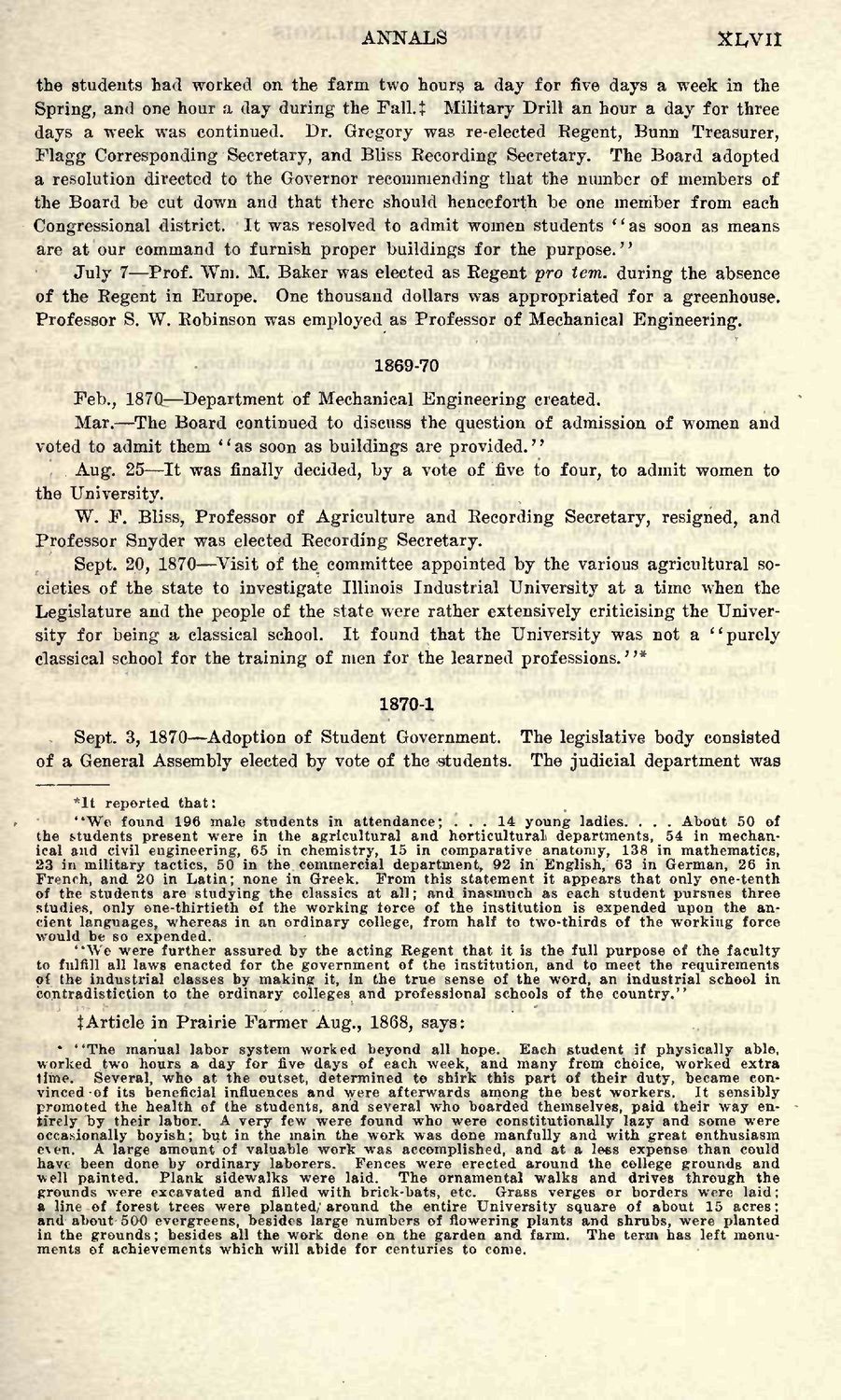| |
| |
Caption: Book - Early History of University (1916)
This is a reduced-resolution page image for fast online browsing.

EXTRACTED TEXT FROM PAGE:
ANNALS xi/vn the students had worked on the farm two hour? a day for five days a week in the Spring, and one hour a day during the Fall. J Military Drill an hour a day for three days a week was continued. Dr. Gregory was re-elected Regent, Bunn Treasurer, Flagg Corresponding Secretary, and Bliss Eecording Secretary. The Board adopted a resolution directed to the Governor recommending that the number of members of the Board be cut down and that there should henceforth be one member from each Congressional district. I t was resolved to admit women students " a s soon as means are at our command to furnish proper buildings for the p u r p o s e . " July 7—Prof. Wm. M. Baker was elected as Regent pro tern, during the absence of the Regent in Europe. One thousand dollars was appropriated for a greenhouse. Professor S. W. Robinson was employed as Professor of Mechanical Engineering. 1869-70 Feb., 187Q.—Department of Mechanical Engineering created. Mar.—The Board continued to discuss the question of admission of women and voted to admit them ' ' as soon as buildings are provided.'' , Aug. 25—It was finally decided, by a vote of five to four, to admit women to the University. W. F . Bliss, Professor of Agriculture and Recording Secretary, resigned, and Professor Snyder was elected Recording Secretary. Sept. 20, 1870—"Visit of the_ committee appointed by the various agricultural societies of the state to investigate Illinois Industrial University a t a time when the Legislature and the people of the state were rather extensively criticising the University for being a. classical school. I t found that the University was not a ' ' purely classical school for the training of men for the learned professions."* 1870-1 Sept. 3, 1870—Adoption of Student Government. The legislative body consisted of a General Assembly elected by vote of the students. The judicial department was *lt reported that: "We found 196 male students in attendance; . . . 14 young ladies. . . . About 50 of the students present were in the agricultural and horticultural departments, 54 in mechanical and civil engineering, 65 in chemistry, 15 in comparative anatomy, 138 in mathematics, 23 in military tactics, 50 in the commercial department, 92 in' English, 63 in German, 26 in French, and 20 in Latin; none in Greek. From this statement it appears that only one-tenth of the students are studying the classics at all; and inasmuch as each student pursues three studies, only one-thirtieth of the working force of the institution is expended upon the ancient languages, whereas in an ordinary college, from half to two-thirds of the working force would be so expended. "Wo were further assured by the acting Regent that it is the full purpose of the faculty to fulfill all laws enacted for the government of the institution, and to meet the requirements of the industrial classes by making it, In the true sense of the word, an industrial school in contradistiction to the ordinary colleges and professional schools of the country." {Article in Prairie F a n n e r Aug., 1868, says: * "The manual labor system worked beyond all hope. Each student if physically able, worked two hours a day for five days of each week, and many from choice, worked extra time. Several, who at the outset, determined to shirk this part of their duty, became convinced-of its beneficial influences and were afterwards among the best workers. It sensibly promoted the health of the students, and several who boarded themselves, paid their way entirely *by their labor. A very few were found who were constitutionally lazy and some were occasionally boyish; but in the main the work was done manfully and with great enthusiasm e\en. A large amount of valuable work was accomplished, and at a less expense than could have been done by ordinary laborers. Fences were erected around the college grounds and well painted. Plank sidewalks were laid. The ornamental walks and drives through the grounds were excavated and filled with brick-bats, etc. Grass verges or borders were laid; a line of forest trees were planted/around the entire University square of about 15 acres; and about-500 evergreens, besides large numbers of flowering plants and shrubs, were planted in the grounds; besides all the work done on the garden and farm. The term has left monuments of achievements which will abide for centuries to come.
| |